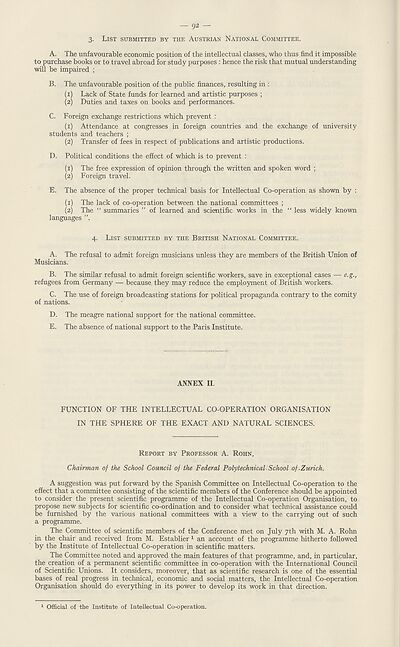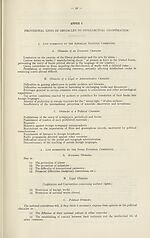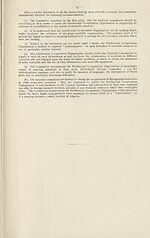International > Proceedings of the second General conference of national committees on intellectual co-operation, Paris, July 5th-9th, 1937
(94)
Download files
Complete book:
Individual page:
Thumbnail gallery: Grid view | List view

— 92 —
3. List submitted by the Austrian National Committee.
A. The unfavourable economic position of the intellectual classes, who thus find it impossible
to purchase books or to travel abroad for study purposes : hence the risk that mutual understanding
will be impaired ;
B. The unfavourable position of the public finances, resulting in :
(1) Lack of State funds for learned and artistic purposes ;
(2) Duties and taxes on books and performances.
C. Foreign exchange restrictions which prevent :
(1) Attendance at congresses in foreign countries and the exchange of university
students and teachers ;
(2) Transfer of fees in respect of publications and artistic productions.
D. Political conditions the effect of which is to prevent :
(1) The free expression of opinion through the written and spoken word ;
(2) Foreign travel.
E. The absence of the proper technical basis for Intellectual Co-operation as shown by :
(1) The lack of co-operation between the national committees ;
(2) The “ summaries ” of learned and scientific works in the “ less widely known
languages ”.
4. List submitted by the British National Committee.
A. The refusal to admit foreign musicians unless they are members of the British Union of
Musicians.
B. The similar refusal to admit foreign scientific workers, save in exceptional cases — e.g.,
refugees from Germany — because they may reduce the employment of British workers.
C. The use of foreign broadcasting stations for political propaganda contrary to the comity
of nations.
D. The meagre national support for the national committee.
E. The absence of national support to the Paris Institute.
ANNEX II.
FUNCTION OF THE INTELLECTUAL CO-OPERATION ORGANISATION
IN THE SPHERE OF THE EXACT AND NATURAL SCIENCES.
Report by Professor A. Rohn,
Chairman of the School Council of the Federal Polytechnical-School of.Zurich.
A suggestion was put forward by the Spanish Committee on Intellectual Co-operation to the
effect that a committee consisting of the scientific members of the Conference should be appointed
to consider the present scientific programme of the Intellectual Co-operation Organisation, to
propose new subjects for scientific co-ordination and to consider what technical assistance could
be furnished by the various national committees with a view to the carrying out of such
a programme.
The Committee of scientific members of the Conference met on July 7th with M. A. Rohn
in the chair and received from M. Establier 1 an account of the programme hitherto followed
by the Institute of Intellectual Co-operation in scientific matters.
The Committee noted and approved the main features of that programme, and, in particular,
the creation of a permanent scientific committee in co-operation with the International Council
of Scientific Unions. It considers, moreover, that as scientific research is one of the essential
bases of real progress in technical, economic and social matters, the Intellectual Co-operation
Organisation should do everything in its power to develop its work in that direction.
Official of the Institute of Intellectual Co-operation.
3. List submitted by the Austrian National Committee.
A. The unfavourable economic position of the intellectual classes, who thus find it impossible
to purchase books or to travel abroad for study purposes : hence the risk that mutual understanding
will be impaired ;
B. The unfavourable position of the public finances, resulting in :
(1) Lack of State funds for learned and artistic purposes ;
(2) Duties and taxes on books and performances.
C. Foreign exchange restrictions which prevent :
(1) Attendance at congresses in foreign countries and the exchange of university
students and teachers ;
(2) Transfer of fees in respect of publications and artistic productions.
D. Political conditions the effect of which is to prevent :
(1) The free expression of opinion through the written and spoken word ;
(2) Foreign travel.
E. The absence of the proper technical basis for Intellectual Co-operation as shown by :
(1) The lack of co-operation between the national committees ;
(2) The “ summaries ” of learned and scientific works in the “ less widely known
languages ”.
4. List submitted by the British National Committee.
A. The refusal to admit foreign musicians unless they are members of the British Union of
Musicians.
B. The similar refusal to admit foreign scientific workers, save in exceptional cases — e.g.,
refugees from Germany — because they may reduce the employment of British workers.
C. The use of foreign broadcasting stations for political propaganda contrary to the comity
of nations.
D. The meagre national support for the national committee.
E. The absence of national support to the Paris Institute.
ANNEX II.
FUNCTION OF THE INTELLECTUAL CO-OPERATION ORGANISATION
IN THE SPHERE OF THE EXACT AND NATURAL SCIENCES.
Report by Professor A. Rohn,
Chairman of the School Council of the Federal Polytechnical-School of.Zurich.
A suggestion was put forward by the Spanish Committee on Intellectual Co-operation to the
effect that a committee consisting of the scientific members of the Conference should be appointed
to consider the present scientific programme of the Intellectual Co-operation Organisation, to
propose new subjects for scientific co-ordination and to consider what technical assistance could
be furnished by the various national committees with a view to the carrying out of such
a programme.
The Committee of scientific members of the Conference met on July 7th with M. A. Rohn
in the chair and received from M. Establier 1 an account of the programme hitherto followed
by the Institute of Intellectual Co-operation in scientific matters.
The Committee noted and approved the main features of that programme, and, in particular,
the creation of a permanent scientific committee in co-operation with the International Council
of Scientific Unions. It considers, moreover, that as scientific research is one of the essential
bases of real progress in technical, economic and social matters, the Intellectual Co-operation
Organisation should do everything in its power to develop its work in that direction.
Official of the Institute of Intellectual Co-operation.
Set display mode to:
![]() Universal Viewer |
Universal Viewer | ![]() Mirador |
Large image | Transcription
Mirador |
Large image | Transcription
Images and transcriptions on this page, including medium image downloads, may be used under the Creative Commons Attribution 4.0 International Licence unless otherwise stated. ![]()
| League of Nations > International > Proceedings of the second General conference of national committees on intellectual co-operation, Paris, July 5th-9th, 1937 > (94) |
|---|
| Permanent URL | https://digital.nls.uk/195218397 |
|---|
| Shelfmark | LN.XII |
|---|
| Description | Over 1,200 documents from the non-political organs of the League of Nations that dealt with health, disarmament, economic and financial matters for the duration of the League (1919-1945). Also online are statistical bulletins, essential facts, and an overview of the League by the first Secretary General, Sir Eric Drummond. These items are part of the Official Publications collection at the National Library of Scotland. |
|---|---|
| Additional NLS resources: |
|

